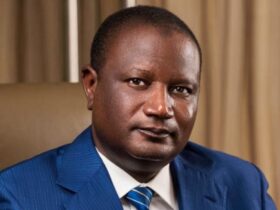
Geert Wilders, a seasoned populist figure known for his anti-Islam stance, has secured a compelling triumph in the Dutch general election, as nearly all votes have been tallied.
With a political career spanning 25 years, his Freedom Party (PVV) is poised to claim 37 seats, a considerable lead over his closest competitor, a left-wing coalition.
READ ALSO: France Sues EU for Deciding To Provide Employment Assessments In English
His victory has sent shockwaves through Dutch politics, and its reverberations are poised to resonate across Europe.
To fulfill his commitment to being a “prime minister for everyone,” he must now engage in negotiations and seek collaboration with other parties to form a coalition.
His target is to secure 76 seats in the 150-seat parliament.
At a party gathering on Thursday, the 60-year-old Mr. Wilders basked in cheers and toasts from party members in a room teeming with TV cameras.
In an interview with the BBC, he expressed his willingness to negotiate and compromise with other parties in his pursuit of the prime ministership.
The leader of the PVV successfully tapped into widespread discontent about migration, pledging to “close borders” and temporarily shelving his vow to ban the Koran.
In his triumphant speech, he declared, “We want to govern, and… we will govern. [The seat numbers] are an enormous compliment but also an enormous responsibility.”
Prior to the election, the three major parties had ruled out participating in a government led by Wilders due to his far-right policies.
However, the scale of his victory may prompt a reassessment of this stance.
The left-wing alliance led by former EU commissioner Frans Timmermans secured a distant second place with 25 seats, according to a forecast based on 94% of the vote.
Timmermans vehemently rejected the idea of a Wilders-led government, vowing to defend Dutch democracy and the rule of law.
The third-placed center-right liberal VVD, led by new leader Dilan Yesilgöz, and the fourth-placed new party formed by whistleblower MP Pieter Omtzigt both congratulated Wilders on his result.
While Yesilgöz doubts Wilders’ ability to secure the necessary support, she emphasizes that the decision lies with her party colleagues.
Despite her earlier declaration that she would not serve in a Wilders-led cabinet, she did not rule out potential collaboration. Initially resistant, Omtzigt’s New Social Contract party is now “available to turn this trust [of voters] into action” in possible cooperation with Wilders.








Leave a Reply